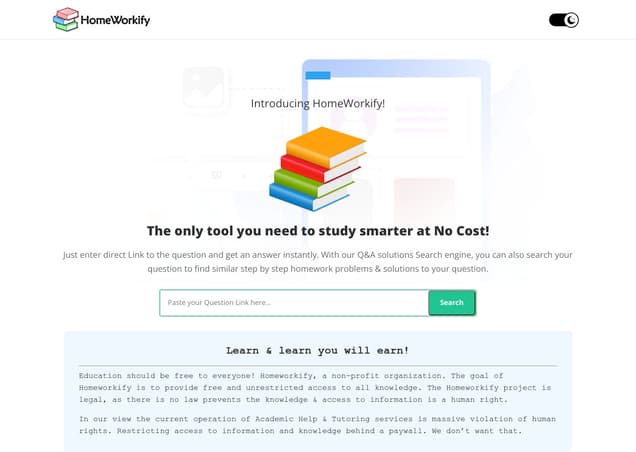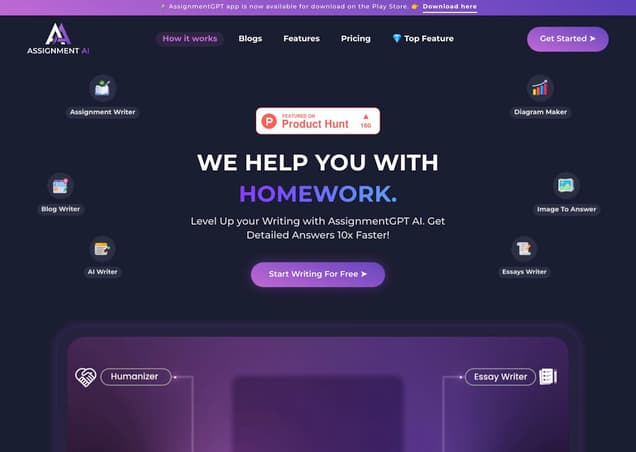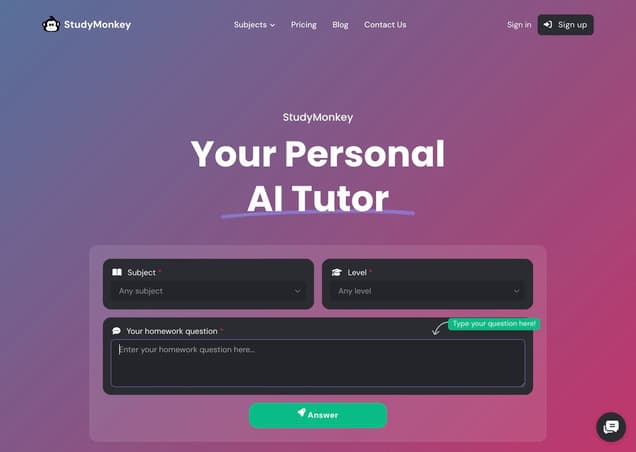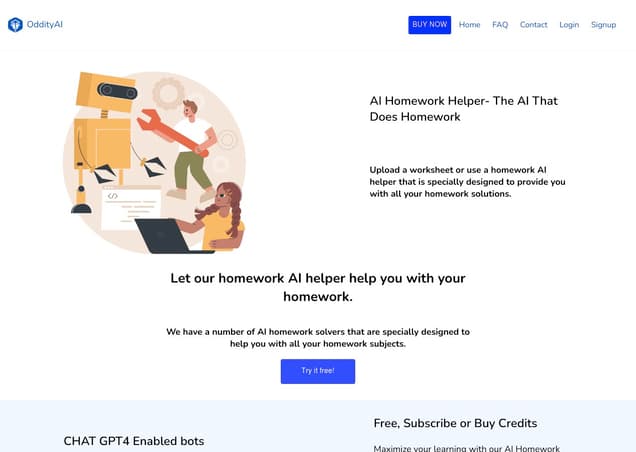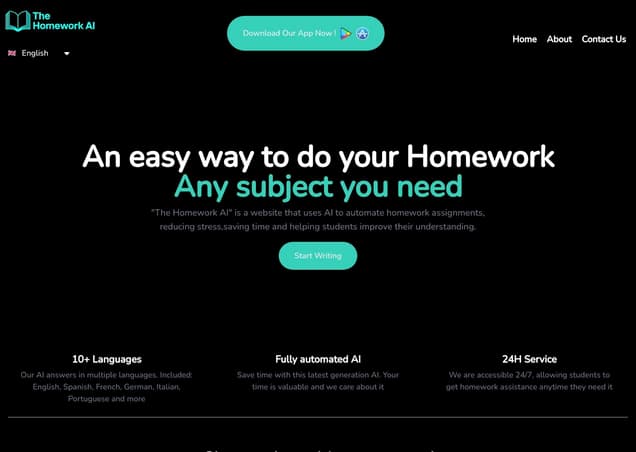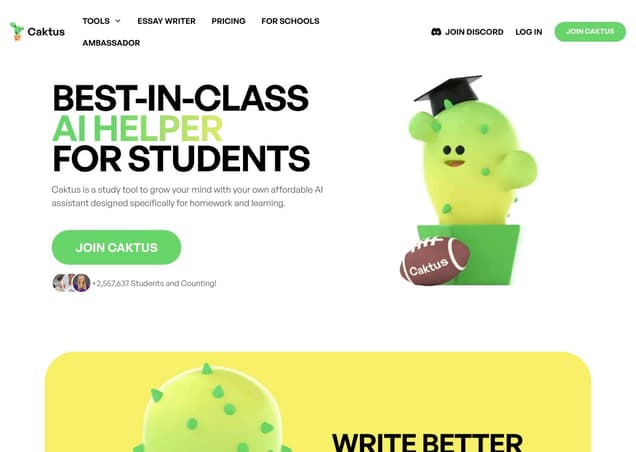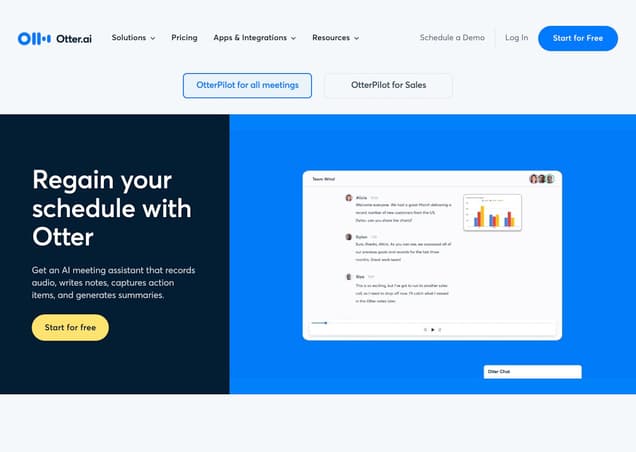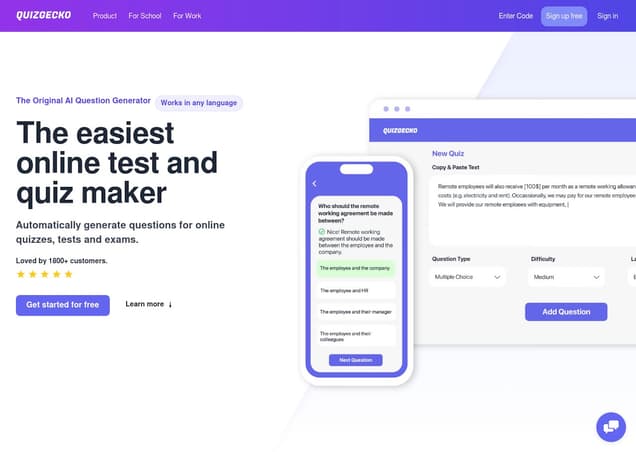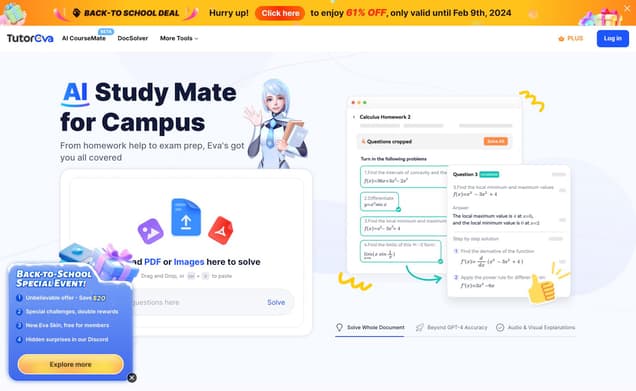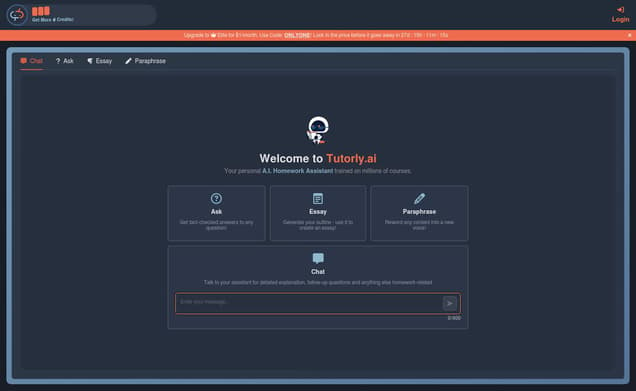Gradescope
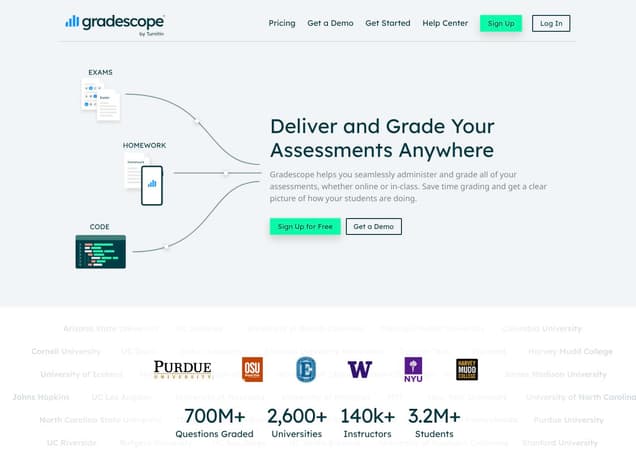
What is Gradescope ?
Gradescope.com is an AI-powered educational platform that serves as an advanced tool for educators and students alike. It goes beyond traditional grading systems, offering features like an AI homework helper, AI homework solver, and AI for homework assistance.
Features :
- AI-powered grading
- Homework assistance
- Detailed analytics
- Efficient feedback mechanisms
Pricing :
- Gradescope offers various pricing plans tailored to the needs of educators and institutions. For specific details, please visit the official website.
Estimated Visit Traffic :
6.16M /MonthUser Distribution :
United States - 89.12% | Hong Kong - 1.04% | Saudi Arabia - 1.0% | Belgium - 0.92% | United Kingdom - 0.84%Tags :
AI HomeworkAI Masterclass with Sergey Karayev: Shaping the Future of Education
Diving into the fascinating world of Artificial Intelligence (AI) in education, Sergey Karayev, the co-founder of Gradescope and the head of AI for STEM at Turnitin, shares his expertise and insights. This article brings to light the essential elements of his masterclass, discussing AI's potential, its educational impact, and the skills required to navigate the swiftly evolving AI landscape.
1. Understanding AI: Terms, History, and Possibilities
Sergey Karayev defines AI as intelligent behavior demonstrated by machines, distinguishing it from natural intelligence. Within the AI spectrum, he places machine learning and its subset, deep learning, which are pivotal in making data-driven predictions. He emphasizes the current focus on deep learning as the spearhead of AI advancements.,Karayev traces the origins of AI back to Alan Turing's proposition of the Turing Test and charts its evolution, including the increase in commercially viable AI frameworks focused predominantly on supervised learning. He touches on the intriguing yet difficult task of image recognition, posing challenges such as distinguishing chihuahuas from muffins, and recognizing different lighting conditions in photos as examples.,The future scope of AI as envisaged by Karayev includes the progression of both supervised learning and the emerging fields of unsupervised learning and reinforcement learning. The potential impact of AI on society, including the automation of jobs, calls for effective education to mitigate upheavals. Highlighting the substantial progress AI has made in education and technology, Karayev's vision sets the tone for AI's possibilities and its integration into structured learning.
2. AI Application Grading Rubric and Practical Use Cases
Karayev shares a unique grading rubric to assess AI applications, focusing on task formulation validity, user interface and performance requirements, as well as data quality. He challenges attendees to consider not only whether AI can solve a problem but also if it should, underlining the ethical and practical considerations in AI deployment.,The effectiveness of an AI application can be graded based on how it tackles a task, the finesse of its user interface, and its capacity to perform to or beyond human levels. Mistakes made by AI can vary in severity, from trivial to dangerous, and this must shape the application's user experience design.,Karayev provides examples of AI tools like Grammarly, which enhances writing through AI prompts that are educational, and Google Photos, which uses AI to sort images and learns from user inputs. Such interactive platforms underscore how user feedback can refine AI algorithms, creating smarter applications with wider benefits.
3. The Roles in AI and Effective Hiring Strategies
The masterclass discusses various key roles integral to AI development and deployment, including data engineers, machine learning researchers, and machine learning engineers. Karayev advises on identifying the specific skills needed for each role and the importance of having a diverse team to meet the multifaceted demands of AI projects.,He illustrates the skill set matrix required for different AI jobs, remarking that not all roles need deep knowledge of machine learning, but a solid background in software development is crucial. Communication abilities are also highlighted as an essential skill, particularly for data scientists who bridge the gap between technical findings and business insights.,Karayev provides practical tips on sourcing candidates for different AI roles. For instance, data engineers might come from a software engineering background, whereas machine learning researchers typically possess advanced degrees. He underscores the scarcity of AI talent and stresses the strategic advantage of fostering an environment where team members can continually develop and share their expertise.
4. Gradescope Video Summary
In his masterclass, Sergey Karayev delivers a comprehensive overview of AI, particularly its role in education. He dissects the terminology, the history, and the current and potential applications of AI. Karayev also presents a grading rubric for AI applications, discusses various AI roles, hiring strategies, and emphasizes the importance of data quality in AI's success. This article encapsulates his vision, revealing how AI is becoming an indispensable tool in the educational field.
Other Gradescope Related Videos

Using Gradescope to Grade Paper Assignments & Track Student Success - YouTubeFeb 22, 2021

Key Developments of AI in the Education Sector - Developments from Gradescope, Stanford & Coursera - YouTubeJul 14, 2020

Gradescope in Canvas - YouTubeFeb 23, 2021

How To Use Gradescope In Your Canvas Course. #gradescope #learningmanagementsystem #canvas - YouTubeSep 7, 2022

What is Gradescope? - YouTubeJul 1, 2022

Tech Tuesdays: Assessment with Gradescope - YouTubeMar 13, 2021

Versão completa do Gradescope - YouTubeJul 25, 2022

How to capture images and submit to Gradescope - YouTubeAug 14, 2020

Ignite your Gradescope Love Affair - A Power User Top 10 - YouTubeNov 21, 2019
User Reviews On Twitter
 Derek ColleyConsulting Technology Lead, CTO & CIOJust found @gradescope. Loving the concept!
Derek ColleyConsulting Technology Lead, CTO & CIOJust found @gradescope. Loving the concept!
gradescope.com/ CSULB Academic Technology ServicesAcademic Technology Services (ATS) delivers and supports educational technology to the CSULB campus community. Follow us on Instagram! @csulbatsFaculty Workshop:
CSULB Academic Technology ServicesAcademic Technology Services (ATS) delivers and supports educational technology to the CSULB campus community. Follow us on Instagram! @csulbatsFaculty Workshop:
GRADESCOPE FOR ONLINE & HYBRID TEACHING
Feb. 23 | 10am
See how to set up an assignment, grade consistently with a rubric, provide students with rich targeted feedback, and easily return work electronically.
info.gradescope.com/workshop-series
#CSULB
 Kevin GutowskiPreviously @gradescope. Asking questions ❓, Taking photos 📸, Designing stuff ✨, and making some music 🎻 He/HimI’m so proud of our new landing page for @gradescope. It’s something that we have been wanting to do for a long time and I’m really happy to see it finally come together. www.gradescope.com/
Kevin GutowskiPreviously @gradescope. Asking questions ❓, Taking photos 📸, Designing stuff ✨, and making some music 🎻 He/HimI’m so proud of our new landing page for @gradescope. It’s something that we have been wanting to do for a long time and I’m really happy to see it finally come together. www.gradescope.com/
 Caroline Winnett 🐻Executive Director, Berkeley SkyDeck. Startup scholar, violinist, skier, cyclist. I'm bullish on (Cal) Bears.SkyDeck alum Gradescope gets acquired! @gradescope blog.gradescope.com/gradescope-joins-turnitin-2d8cb716f94e
Caroline Winnett 🐻Executive Director, Berkeley SkyDeck. Startup scholar, violinist, skier, cyclist. I'm bullish on (Cal) Bears.SkyDeck alum Gradescope gets acquired! @gradescope blog.gradescope.com/gradescope-joins-turnitin-2d8cb716f94e Ryan HazenAdvocating education in human community during the age of technology. Knowledge is collective so I can't really call these tweets my own.#nwmet2018 cool handwriting recognition in maths with gradescope gradescope.com
Ryan HazenAdvocating education in human community during the age of technology. Knowledge is collective so I can't really call these tweets my own.#nwmet2018 cool handwriting recognition in maths with gradescope gradescope.com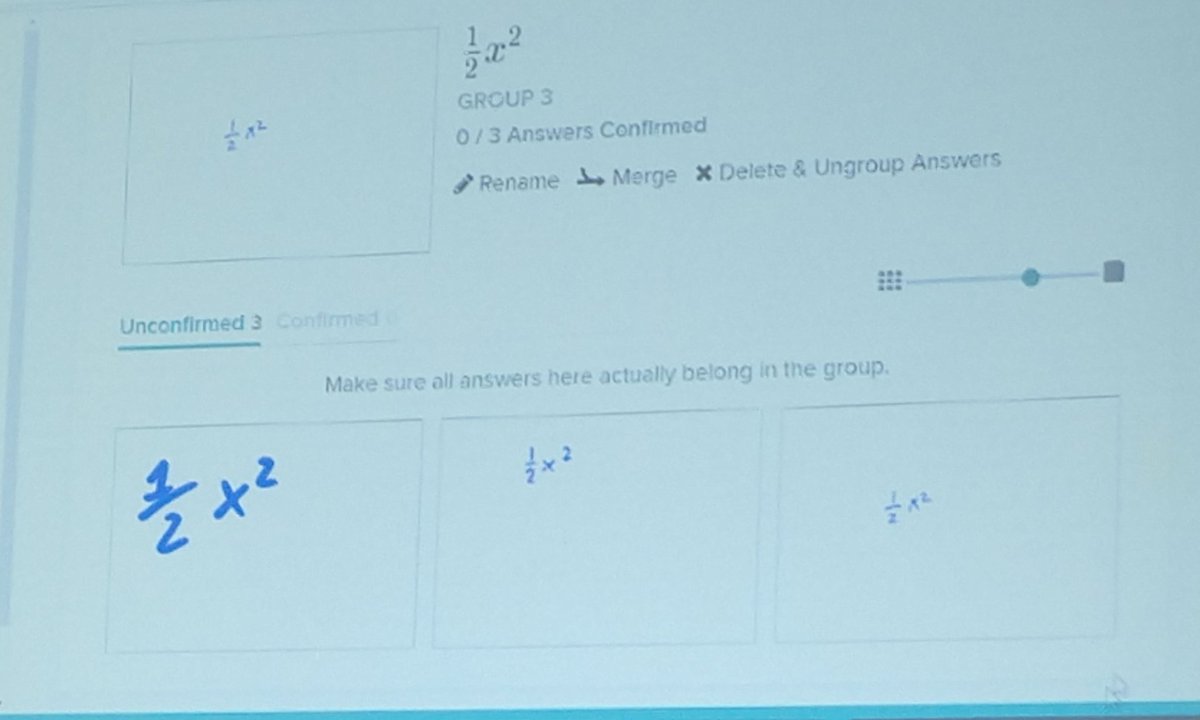
 Dr. Dan BakerAI for education innovator 🚀 Teaching 5k+ future engineers @ColoradoStateU 🎓 OER Author @EngrStatics 📚 Join me in revolutionizing education with AI 💡I just saw that @Gradescope is extending free access through fall. This is a generous offer to use the best time-saving tool I've discovered in the past few years.
Dr. Dan BakerAI for education innovator 🚀 Teaching 5k+ future engineers @ColoradoStateU 🎓 OER Author @EngrStatics 📚 Join me in revolutionizing education with AI 💡I just saw that @Gradescope is extending free access through fall. This is a generous offer to use the best time-saving tool I've discovered in the past few years.
If you are a teacher, save some time & provide better feedback to your Ss: use Gradescope!
blog.gradescope.com/recent-updates-to-help-with-urgent-remote-assessment-needs-responding-to-covid-19-61dae0d57d4a Pieter AbbeelProfessor at Berkeley; Founder of Covariant & Gradescope; The Robot Brains Podcast Host; Investment Partner at AIX VenturesKnow any instructors / TAs doing a lot of homework/exam/project grading and want to help them save a lot of time this school year? Good time to point them to gradescope.com, we just revamped the landing page! :) @gradescope
Pieter AbbeelProfessor at Berkeley; Founder of Covariant & Gradescope; The Robot Brains Podcast Host; Investment Partner at AIX VenturesKnow any instructors / TAs doing a lot of homework/exam/project grading and want to help them save a lot of time this school year? Good time to point them to gradescope.com, we just revamped the landing page! :) @gradescope
 Whitney DuimAssistant Professor of Teaching Chemistry at @UCDChem, Mom to 2 boys + 1 dog, she/her/hersLooking forward to presenting with Julia Chamberlain of @UCDChem at the Gradescope Summit tomorrow!
Whitney DuimAssistant Professor of Teaching Chemistry at @UCDChem, Mom to 2 boys + 1 dog, she/her/hersLooking forward to presenting with Julia Chamberlain of @UCDChem at the Gradescope Summit tomorrow!
info.gradescope.com/noa-gradescope-summit Keri KornelsonOU peeps: There are some upcoming Gradescope workshops. Dates and information can be found at www.ou.edu/teachanywhere. Gradescope is a great way to grade student work in both online and face-to-face courses. www.gradescope.com/get_started @gradescope @cfeOU
Keri KornelsonOU peeps: There are some upcoming Gradescope workshops. Dates and information can be found at www.ou.edu/teachanywhere. Gradescope is a great way to grade student work in both online and face-to-face courses. www.gradescope.com/get_started @gradescope @cfeOU Simi - Website SuperheroSmart Humans at Work. No AI. 💻 💰💲 Contact for Super-Converting Websites and Digital Marketing for Local Businesses, Side Hustlers and Corporate ProfessionalsGradescope.com: Online #grading platform that streamlines assessment and provides efficient #feedback for instructors.
Simi - Website SuperheroSmart Humans at Work. No AI. 💻 💰💲 Contact for Super-Converting Websites and Digital Marketing for Local Businesses, Side Hustlers and Corporate ProfessionalsGradescope.com: Online #grading platform that streamlines assessment and provides efficient #feedback for instructors.
#coaching #mentoring
What users think about Gradescope - from Twitter
- Users appreciate Gradescope for its concept and its time-saving grading tools.
- Gradescope offers workshops for faculty on setting up assignments, grading with rubrics, providing feedback, and electronic return of work.
- The new landing page for Gradescope has been well-received and marks a milestone for the team.
- Gradescope has been acquired, indicating possible growth and success.
- The platform boasts advanced features like handwriting recognition for grading mathematics.
- Gradescope has extended free access for certain periods, highlighting their commitment to support educators and students.
- Gradescope is recommended for saving time on grading for homework, exams, and projects.
- Educational institutions and faculty are utilizing Gradescope for both online and face-to-face courses.
- Gradescope is an online grading platform that streamlines the assessment process and enhances the efficiency of feedback from instructors.
Gradescope Pros and Cons
Pros :
- Time-saving automated grading
- Personalized homework assistance
- Insightful analytics for educators
Cons :
- Dependence on technology may pose challenges for some educators
- Requires adaptation to a new grading system
Gradescope FQA
1. What is Gradescope?
Gradescope is an AI-enhanced platform designed to streamline the grading process and provide intelligent assistance with homework.
2. How does the AI homework solver work?
The AI homework solver in Gradescope utilizes advanced algorithms to analyze and understand homework problems, providing step-by-step solutions.
3. Can Gradescope be used for subjects other than math?
Yes, Gradescope is versatile and can be applied across various subjects, making it a valuable tool for educators in diverse fields.
Gradescope Use Cases
- Automated grading for large classes
- Individualized homework support
- Data-driven insights for educators
Similartool.ai Spotlight
Display Your Achievement: Get Our Custom-Made Badge to Highlight Your Success on Your Website and Attract MoreVisitors to Your Solution.
